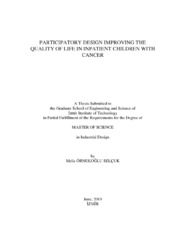Please use this identifier to cite or link to this item:
https://hdl.handle.net/11147/7388Full metadata record
| DC Field | Value | Language |
|---|---|---|
| dc.contributor.advisor | Tunç Cox, Ayça | - |
| dc.contributor.advisor | Hasırcı İnceoğlu, Deniz | - |
| dc.contributor.author | Örnekoğlu Selçuk, Melis | - |
| dc.date.accessioned | 2019-11-27T08:26:36Z | - |
| dc.date.available | 2019-11-27T08:26:36Z | - |
| dc.date.issued | 2019-06 | - |
| dc.identifier.citation | Örnekoğlu Selçuk, M. (2019). Participatory design improving the quality of life in inpatient children with cancer. Unpublished master's thesis, İzmir Institute of Technology, İzmir, Turkey | en_US |
| dc.identifier.uri | https://hdl.handle.net/11147/7388 | - |
| dc.description | Thesis (Master)--Izmir Institute of Technology, Industrial Design, Izmir, 2019 | en_US |
| dc.description | Includes bibliographical references (leaves: 112-118) | en_US |
| dc.description | Text in English; Abstract: Turkish and English | en_US |
| dc.description.abstract | The diagnosis of cancer influences the lives of children in many ways. Instead of maintaining daily activities, children often visit hospitals or stay there for an uncertain period. Due to the disease and treatment, children experience suffering and pain, their school and play activities are interrupted and they become separated from social and familiar environments. This may cause several problems in their development and quality of life (QOL). QOL is the state of well-being in terms of physical, psychological and social aspects. According to surveys that investigate the negative effects of cancer on children’s QOL, “the loss of normalcy” and inability to play, do sports, spend time with family and friends are considered by children to be worse than the physical symptoms and side effects of the treatment. Children with cancer need play during hospitalization in order to pursue their development and to feel normal. A case study was conducted in Dokuz Eylül University Nevvar and Salih İşgören Children’s Hospital in order to understand the needs of children with cancer, provide a design suggestion for their play area, and especially investigate the effects of the participatory design process on QOL of children. A participatory design study was carried out in order to achieve more responsive results to participants’ needs by involving users in the design process. It was found out that the process contributes to the improvement of QOL of children by making them feel that their ideas matter as well as distracting them from negative thoughts regarding cancer. | en_US |
| dc.description.abstract | Kanser teşhisi, çocukların yaşamını birçok açıdan etkiler. Ayrıca çocukların “normal hayatlarına” olumsuz yönde bir etki gösterir. Çocuklar, günlük hayatlarını sürdürmek yerine sıklıkla hastaneye giderler ve tam olarak belirli olmayan bir süre boyunca hastanede kalırlar. Hastalık ve tedavi yöntemleri sebebiyle hayatlarında ani bir değişim meydana gelir. Bu süreçte çocuklar acı çekmeyi, okul ve günlük hayatlarındaki kesintileri, sosyal ve aile ortamlarından ayrı kalmayı ve oyunun eksikliğini tecrübe ederler. Bunun çocukların gelişim sürecinde ve yaşam kalitesinde sorunlara neden olabileceği bilinmektedir. Yaşam kalitesi, insanların fiziksel, zihinsel ve sosyal koşullar bakımından iyi olma halidir. Kanserin çocukların yaşam kalitesi üzerindeki olumsuz etkilerini araştıran çalışmaların sonuçlarına göre “normallik kaybı” ve oyun oynayamama, spor yapamama, aile ve arkadaşlar ile vakit geçirememe; çocuklar tarafından bu hastalığın fiziksel belirtilerinden ve yan etkilerinden daha kötü olarak tanımlanmıştır. Çocukların hastanede yattıkları süre boyunca fiziksel, zihinsel ve duygusal gelişimlerini sürdürebilmeleri ve normal hissetmeleri için oyuna ihtiyaçları vardır. Dokuz Eylül Üniversitesi Nevvar ve Salih İşgören Çocuk Hastanesi'nde kanserle mücadele eden çocukların ihtiyaçlarını anlamak, oyun alanları için bir tasarım önerisi sağlamak ve özellikle bu katılımcı tasarım sürecinin çocukların yaşam kalitesi üzerine etkilerini araştırmak için bir alan çalışması yürütülmüştür. Katılımcıları tasarım sürecine dâhil ederek katılımcıların ihtiyaçlarına daha iyi yanıt verebilmek için katılımcı tasarım çalışması yapılmıştır. Bu sürecin, çocukların fikirlerinin önemli olduğunu hissetmelerini sağlayarak ve onları kanserle ilgili olumsuz düşüncelerden uzaklaştırarak çocukların yaşam kalitesini iyileştirmelerine katkıda bulunduğu saptanmıştır. | en_US |
| dc.format.extent | xiii, 148 leaves | - |
| dc.language.iso | en | en_US |
| dc.publisher | Izmir Institute of Technology | en_US |
| dc.rights | info:eu-repo/semantics/openAccess | en_US |
| dc.subject | Participatory design | en_US |
| dc.subject | Generative techniques | en_US |
| dc.subject | Quality of life | en_US |
| dc.subject | Children with cancer | en_US |
| dc.subject | Hospitalization | en_US |
| dc.subject | Play area design | en_US |
| dc.title | Participatory Design Improving the Quality of Life in Inpatient Children With Cancer | en_US |
| dc.title.alternative | Kanserle Mücadele Eden Çocukların Hayat Kalitesini Arttırmak için Katılımcı Tasarım | en_US |
| dc.type | Master Thesis | en_US |
| dc.institutionauthor | Örnekoğlu Selçuk, Melis | - |
| dc.department | Thesis (Master)--İzmir Institute of Technology, Industrial Design | en_US |
| dc.relation.publicationcategory | Tez | en_US |
| dc.identifier.wosquality | N/A | - |
| dc.identifier.scopusquality | N/A | - |
| item.openairecristype | http://purl.org/coar/resource_type/c_18cf | - |
| item.languageiso639-1 | en | - |
| item.openairetype | Master Thesis | - |
| item.grantfulltext | open | - |
| item.fulltext | With Fulltext | - |
| item.cerifentitytype | Publications | - |
| crisitem.author.dept | 01.01. Units Affiliated to the Rectorate | - |
| Appears in Collections: | Industrial Design / Endüstriyel Tasarım Master Degree / Yüksek Lisans Tezleri Sürdürülebilir Yeşil Kampüs Koleksiyonu / Sustainable Green Campus Collection | |
Files in This Item:
| File | Description | Size | Format | |
|---|---|---|---|---|
| T001986.pdf | MasterThesis | 15.85 MB | Adobe PDF |  View/Open |
CORE Recommender
Page view(s)
372
checked on Mar 31, 2025
Download(s)
226
checked on Mar 31, 2025
Google ScholarTM
Check
Items in GCRIS Repository are protected by copyright, with all rights reserved, unless otherwise indicated.